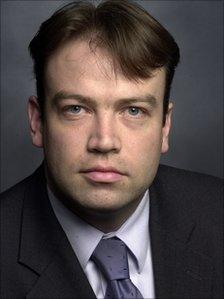The hidden pain of stillbirths
- Published
- comments
A few years ago some good friends of Chris Heaton-Harris, the Conservative MP for Daventry, were excitedly awaiting the birth of their second child.

Chris Heaton-Harris MP
The mother developed stomach pains and went to hospital only to be told that the baby she was carrying had died.
"What happened then made up my mind that, should I ever be elected to this place, I would do my best to ensure that in future, no parents would have to suffer the same fate as my friends," Mr Heaton-Harris told MPs.
The debate which he called in Westminster Hall shone a light on an issue which deeply affects many parents and is rarely talked about in public.
Mr Heaton-Harris told the House that 11 babies were stillborn every day in the United Kingdom, averaging out as one in every 200 babies born, or 4,100 babies a year.
"That number is simply too high," he said. "According to a recent study in The Lancet, the UK has one of the worst records for stillbirths, ranking 33rd out of 35 high-income nations ... we need to work out why the women in our nation may be at a higher risk of stillbirth, and what we can do to change that fact.
"There are also some troubling regional differences. How can we explain the 33% difference between the south-west, with the lowest rates, and the East Midlands, of which my constituency is a part, which has the highest rates?"
The Health Minister and Essex MP Simon Burns agreed that stillbirth was "devastating" for families.
"We can do better, we must do better," he told the House.
New standards are being developed for ante-natal care and a big meeting is planned for later in the year to see what more could be done to help the mothers of stillborn and premature babies.
"The Department of Health continues to invest in research in this most important area," he said. "Its Institute of Health research in Cambridge has an ongoing programme looking at women's' health; a major focus is trying to understand the factors linked to stillbirth."
Mr Heaton-Harris also wanted to raise concerns about how some parents are treated by the NHS when their baby is stillborn.
There were examples of stillborn babies denied the last rites; in some places the baby was immediately taken away; some hospitals wanted the mothers to return for follow-up visits to the same unit where they'd given birth. All of which can be very distressing.
He also focused on the fact that any birth of a baby born at less than 24 weeks gestation cannot be registered. "This is very important to most of the parents I have spoken to, because it is a simple process of formally naming their deceased baby," he said.
Mr Burns said standards of care were always being looked at to make sure they were high everywhere. As for registering births, he said the law had already reduced the age that a baby could be registered from 28 to 24 weeks and many hospitals often issued a local certificate for babies stillborn at under 24 weeks.
The debate ended with an assurance from Mr Burns that the government considered ante-natal care one of its highest priorities and a pledge that he would continue to take this very private issue very seriously.